It doesn't matter if you just started trading or even a DeFi degen swapping tokens at midnight, the right mobile wallet can make all the difference.
But here's the catch: not all crypto wallets have the same to offer. Some are sleek and beginner-friendly, others are loaded with advanced tools. Some prioritize privacy, others offer tight integration with centralized exchanges. And of course, there's the ever-important question: how secure is it?
In this guide, we’re diving into the top Android crypto wallets, covering what they offer, who they’re best suited for, and what features you absolutely shouldn’t compromise on. We’ll explore everything from top picks like Trust Wallet and MetaMask so you can find the perfect fit for your crypto lifestyle.
Key Takeaways
- Trust Wallet, MetaMask, Coinbase Wallet, Atomic Wallet, and Exodus are the top Android crypto wallets, each suited for different user profiles and security needs.
- Mobile wallets offer unmatched convenience, but also pose higher risks—especially on Android, where fake apps and malware target crypto users.
- Look for features like biometric login, local key encryption, and secure backup options (like seed phrase encryption or offline storage).
- Wallets like MetaMask and Atomic cater to advanced DeFi users with multi-chain support, DApp access, and in-app staking tools.
- Trust Wallet and Coinbase Wallet offer smooth UX for beginners, with built-in swaps, DApp browsers, and easy onboarding.
- Exodus stands out for its cross-platform sync and no-KYC setup—ideal for privacy-focused users managing assets across devices.
- For maximum security, pair a hot wallet for daily use with a hardware wallet like Ledger or Trezor to store larger holdings offline.
Why Android Users Need a Secure Crypto Wallet
If you’ve ever sent crypto from a café or checked your DeFi positions while stuck in traffic, you’re not alone. Mobile crypto wallets are now a central part of how people manage their assets. But with that convenience comes a catch: mobile devices are frequent targets for hacks and scams.
The Growing Importance of Mobile Wallets
It’s no secret that mobile is dominating. What’s driving this trend?
- Ease of use: Many wallets are beginner-friendly with intuitive interfaces.
- Portability: No more being tied to a desktop — trade, store, or swap from anywhere.
- Seamless DApp access: Connect to DeFi platforms or NFT marketplaces in seconds.
But the same accessibility that makes mobile wallets so appealing can also make them risky. Unlike desktop environments, where users might be more cautious, mobile interfaces often make it easier to miss warning signs, like fake apps or phishing popups. One wrong tap, and your crypto could vanish.
Security Concerns on Android Devices
Android’s open-source design is one of its biggest strengths and also its biggest security headache.
Because users can download apps from virtually anywhere, bad actors exploit this freedom by distributing fake or malicious wallet apps. This isn’t hypothetical; malware like SpyAgent and SparkCat have recently targeted Android users by mimicking popular wallets and harvesting seed phrases through screenshots or clipboard monitoring.
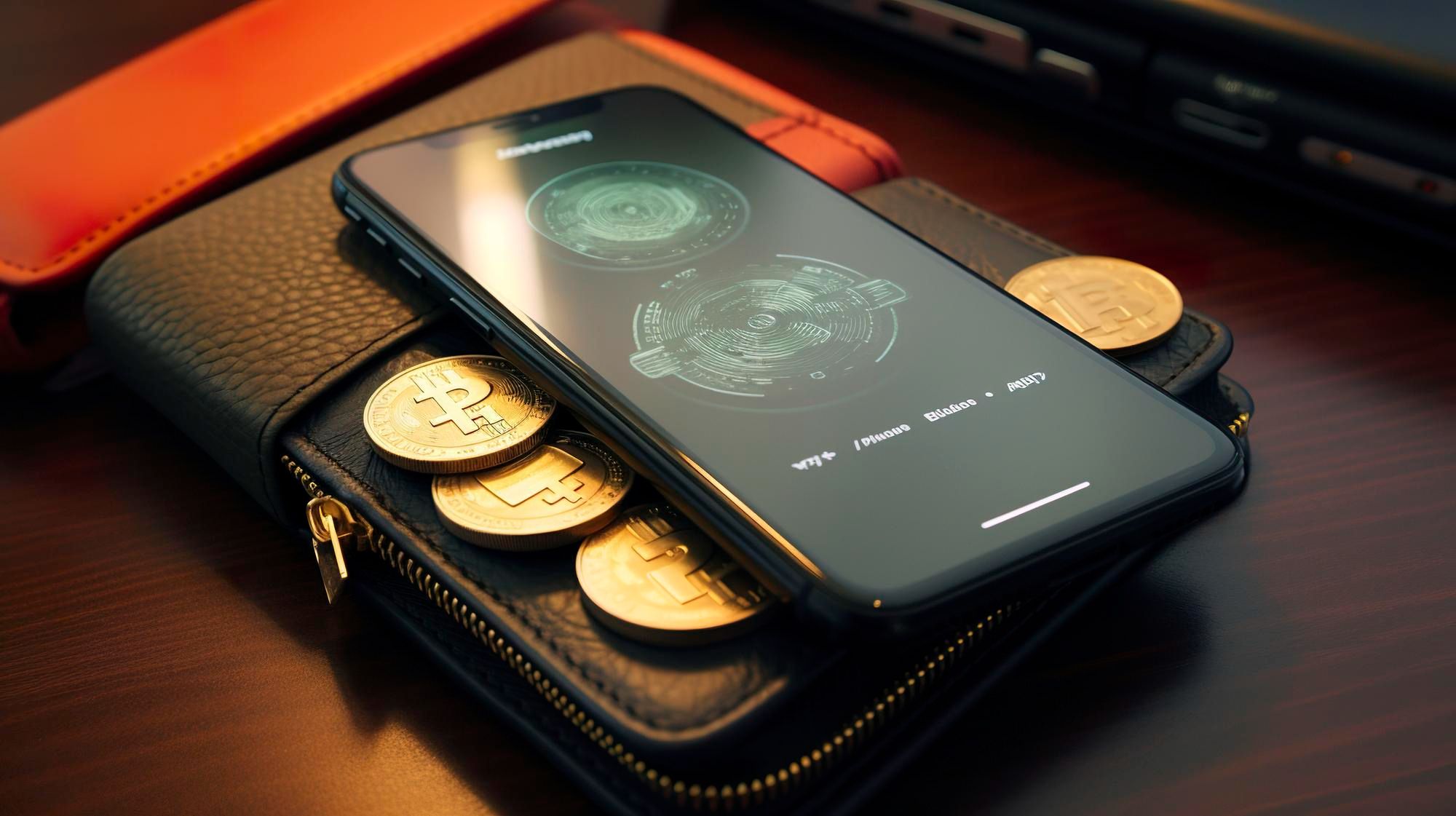 In Crypto, your Phone can either be your Bank Vault… or your Weakest Link. Image via Freepik
In Crypto, your Phone can either be your Bank Vault… or your Weakest Link. Image via FreepikSome key risks Android users face:
- Outdated devices without security patches
- Apps with vulnerable third-party libraries
- Poor app-store moderation outside Google Play
- That’s why serious wallet providers go above and beyond:
- Many now offer biometric logins and 2FA to lock out unauthorized access.
- Some wallets use encrypted storage for seed phrases, often kept in a secure enclave on the device.
- Advanced wallets include anti-phishing tools and transaction monitoring to spot red flags before it's too late.
Key Features to Look for in Android Crypto Wallets
Choosing the right Android crypto wallet isn't just about picking the first app that pops up in the Play Store. It's about finding a wallet that aligns with your needs and requirements. Let's delve into the essential features that make a crypto wallet stand out.
Security & Backup Features
Security is paramount when it comes to managing digital assets. A robust Android crypto wallet should offer:
- Biometric Authentication: Utilizing fingerprint or facial recognition adds an extra layer of security, ensuring that only you can access your wallet.
- Two-Factor Authentication (2FA): This requires a second form of verification, typically a code sent to your device, making unauthorized access significantly more difficult.
- Encryption: Advanced encryption protocols protect your private keys and transaction data from potential breaches.
Equally important is how a wallet handles backups. Look for wallets that provide:
- Seed Phrase Protection: Your recovery phrase should be securely stored, with options to encrypt it or keep it offline.
- Cloud and Manual Backup Options: Flexibility in backup methods ensures you can restore your wallet in case of device loss or failure.
Supported Assets & Multi-Currency Support
A versatile wallet should support a wide range of cryptocurrencies, allowing you to manage diverse assets in one place. Key considerations include:
- Major Cryptocurrencies: Support for Bitcoin (BTC), Ethereum (ETH), and popular stablecoins like USDT and USDC.
- Altcoins and Emerging Tokens: The ability to hold and transact with various altcoins expands your investment opportunities.
- NFT and Layer 2 Token Management: As NFTs and Layer 2 solutions gain traction, wallets should facilitate their storage and transfer seamlessly.
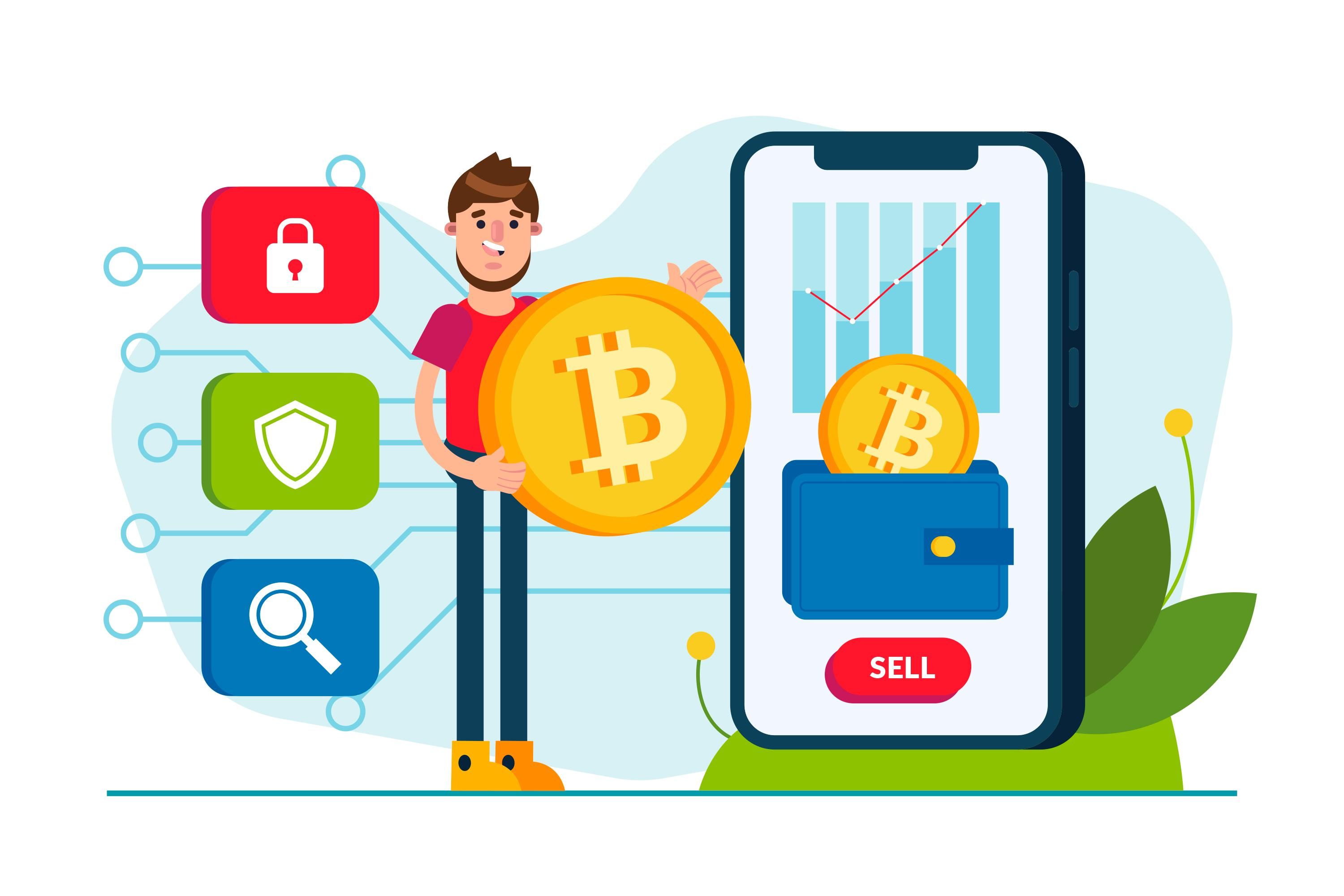 In the End, it comes Down to the Right Combination of Security, Flexibility, and User Experience. Image via Freepik
In the End, it comes Down to the Right Combination of Security, Flexibility, and User Experience. Image via Freepik User Interface & Experience
A user-friendly interface can make or break your experience with a crypto wallet. Essential UI/UX features encompass:
- Ease of Use for Beginners: Intuitive navigation, clear instructions, and helpful tutorials can ease the learning curve for newcomers.
- Advanced Tools for Experienced Traders: Features like customizable transaction fees, detailed analytics, and integration with trading platforms cater to seasoned users.
Integration & Compatibility
In the interconnected world of crypto, your wallet should play well with other tools and platforms. Important integration features include:
- Hardware Wallet Support: Compatibility with devices like the Ledger Nano X allows for enhanced security through cold storage.
- DApp and DeFi Browser Integrations: Access to decentralized applications and financial services directly from your wallet broadens your crypto horizons.
Top Android Crypto Wallets in 2025: Expert Picks
Before we dissect each Android-friendly wallet, let's have a quick roundup of how things look for each.
| Wallet | Best For | Key Features | Hardware Wallet Support | Security |
|---|---|---|---|---|
| Trust Wallet | Beginners, DeFi users | Multi-asset support, DApp browser, staking, built-in exchange | Limited | Local key storage, AES encryption, biometric authentication |
| MetaMask | Web3 users, NFT collectors | Multi-chain access, DApp integration, token swaps, NFT management | Planned via Snaps | Local key encryption, biometric unlock, anti-phishing features |
| Coinbase Wallet | Users already using Coinbase | Exchange integration, NFT support, DApp browser, multi-chain | No | Encrypted key storage, biometric login, optional cloud backup |
| Atomic Wallet | Multi-currency support | In-app swaps, staking, supports 1000+ assets | No | Local key encryption, password protection, device-level security |
| Exodus Wallet | Desktop/mobile sync and usability | Visually appealing UI, staking, hardware wallet support, desktop/mobile sync | Yes (via Trezor and Ledger) | Local encryption, no user data collection, anonymous setup, biometric unlock |
Trust Wallet
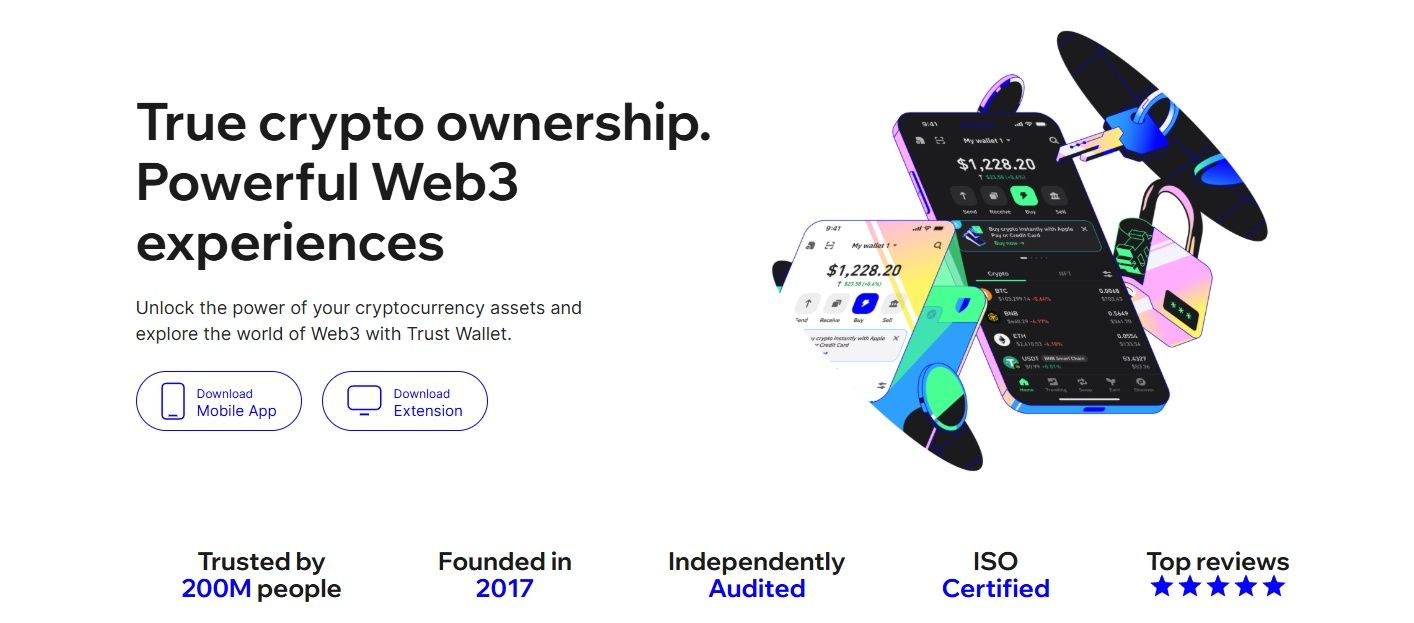 Trust Wallet delivers a Near-Perfect Blend of Accessibility, Security, and DeFi Readiness. Image via Trust Wallet
Trust Wallet delivers a Near-Perfect Blend of Accessibility, Security, and DeFi Readiness. Image via Trust WalletWhen it comes to Android crypto wallets, one name pops up again and again — and for good reason. Whether you’re taking your first steps into crypto or diving deep into DeFi, Trust Wallet has carved out a reputation as a go-to mobile wallet that’s equal parts powerful and user-friendly. Let’s break down what makes it tick in 2025.
Overview
Trust Wallet is a non-custodial, multi-chain wallet designed for mobile users seeking a secure and versatile platform to manage their digital assets. Acquired by Binance in 2018, it supports over 10 million assets across 100+ blockchains, including major cryptocurrencies like Bitcoin, Ethereum, and Solana, as well as a vast array of altcoins and NFTs.
Key Features
- Multi-Asset Support: Manage a diverse portfolio, from mainstream cryptocurrencies to emerging tokens and NFTs.
- Integrated DApp Browser: Access decentralized applications directly within the wallet, facilitating seamless interaction with DeFi platforms.
- In-Wallet Staking: Stake supported tokens to earn rewards without leaving the app.
- Built-In Exchange: Swap cryptocurrencies instantly without relying on external exchanges.
- Security Measures: Private keys are stored locally on the device and encrypted using AES, ensuring users retain full control over their assets.
The wallet's user-friendly interface makes it accessible to beginners, while its robust features cater to the needs of advanced users.
Best for: Beginners, DeFi Users
- Trust Wallet's intuitive design and comprehensive features make it an excellent choice for newcomers to the crypto space. Its integrated DApp browser and staking capabilities also appeal to DeFi enthusiasts looking to engage with decentralized platforms directly from their mobile devices.
Do check out our detailed review of Trust Wallet.
MetaMask
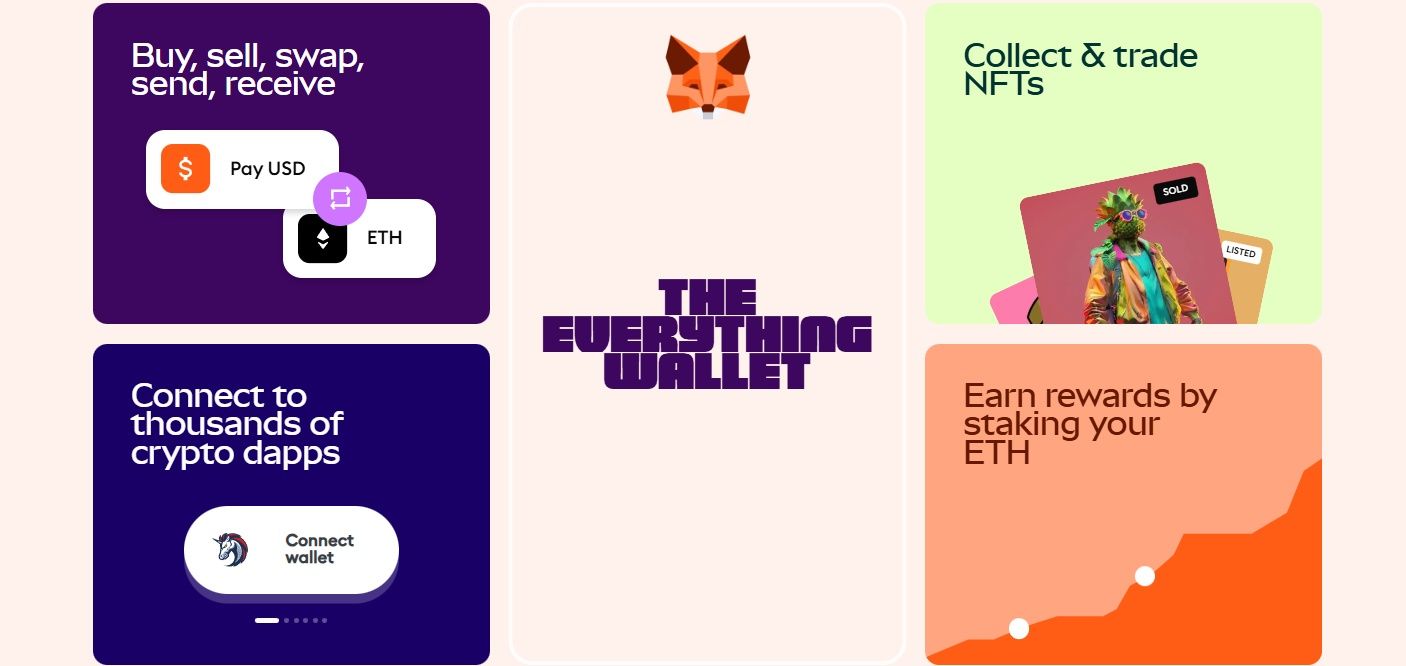 For those Serious about Participating in the Decentralized Future, MetaMask remains a Must-Have. Image via MetaMask
For those Serious about Participating in the Decentralized Future, MetaMask remains a Must-Have. Image via MetaMaskWhen it comes to navigating the decentralized web, MetaMask is the wallet most people think of first — and for good reason. It’s more than just a place to store your ETH; it’s a gateway to the entire Web3 ecosystem, now with even more cross-chain firepower under the hood in 2025.
Overview
MetaMask, built by Consensys, is a self-custodial wallet known for its seamless connection to Ethereum and other EVM-compatible chains. Originally launched as a browser extension, its Android app is now a full-featured mobile hub for Web3 users.
Key Features
- Multi-Chain Access: Connect to Ethereum, BNB Chain, Arbitrum, Optimism, and more — with support for Solana and Bitcoin being rolled out via MetaMask Snaps.
- Built-in DApp Browser: Dive into DeFi platforms, NFT marketplaces, and Web3 games without leaving the wallet.
- Token Swaps: Use the integrated aggregator to swap tokens at the best available rates.
- NFT Management: View, store, and interact with NFTs directly in-app.
- Security: Private keys are encrypted and stored locally, and the wallet supports biometric unlock features.
MetaMask’s intuitive layout continues to evolve, with 2025 updates focused on simplifying navigation and multi-chain management for new users while keeping things snappy for experienced ones.
Best for: Web3 Users and NFT Collectors
- MetaMask is tailor-made for the Web3-native crowd — people who aren’t just holding coins but interacting with protocols. If you’re into DeFi, DAO governance, or NFT collecting, MetaMask gives you direct, flexible access to all of it.
Coinbase Wallet
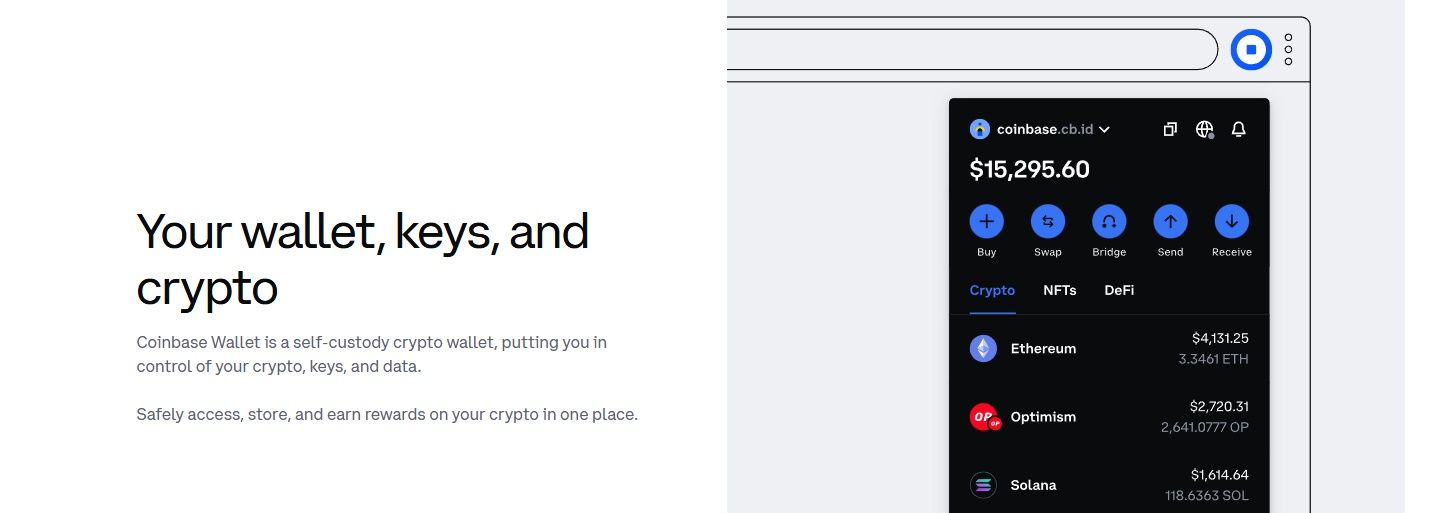 Coinbase Wallet Strikes a Balance between User-Friendly Design and Robust Functionality. Image via Coinbase Wallet
Coinbase Wallet Strikes a Balance between User-Friendly Design and Robust Functionality. Image via Coinbase WalletIf you're already part of the Coinbase ecosystem, Coinbase Wallet offers a seamless bridge between centralized exchange convenience and decentralized self-custody. It's designed for users who appreciate the simplicity of Coinbase's platform but are ready to explore the broader Web3 universe with full control over their assets.
Overview
Coinbase Wallet is a self-custody wallet that empowers users to manage their crypto assets, NFTs, and interact with decentralized applications (DApps) directly from their Android devices. It supports a wide range of assets across multiple blockchains, including Ethereum, Solana, and various Layer 2 networks.
Key Features
- Exchange Integration: Easily link your Coinbase account to transfer funds between your exchange and wallet, facilitating quick access to your assets.
- Multi-Chain Support: Manage assets across various blockchains, enabling diverse portfolio management.
- DApp Browser: Access decentralized applications directly within the wallet, allowing seamless interaction with DeFi platforms and NFT marketplaces.
- NFT Management: Store, view, and manage your NFT collections in one place.
- Security Measures: Private keys are encrypted and stored locally on your device, ensuring you maintain full control over your assets.
The wallet also offers features like cloud backup options and biometric authentication, enhancing both security and user experience.
Best for: Users Already Using Coinbase
- For those already utilizing Coinbase's exchange services, Coinbase Wallet provides an intuitive extension into the decentralized space. It simplifies the transition by allowing easy fund transfers and offering a familiar interface, making it an ideal choice for users looking to explore self-custody without steep learning curves.
Coinbase Wallet strikes a balance between user-friendly design and robust functionality. It's a natural progression for Coinbase users aiming to delve deeper into the crypto ecosystem, offering the tools needed to navigate the decentralized world confidently.
Don't miss our detailed review of Coinbase Wallet for better insight.
Atomic Wallet
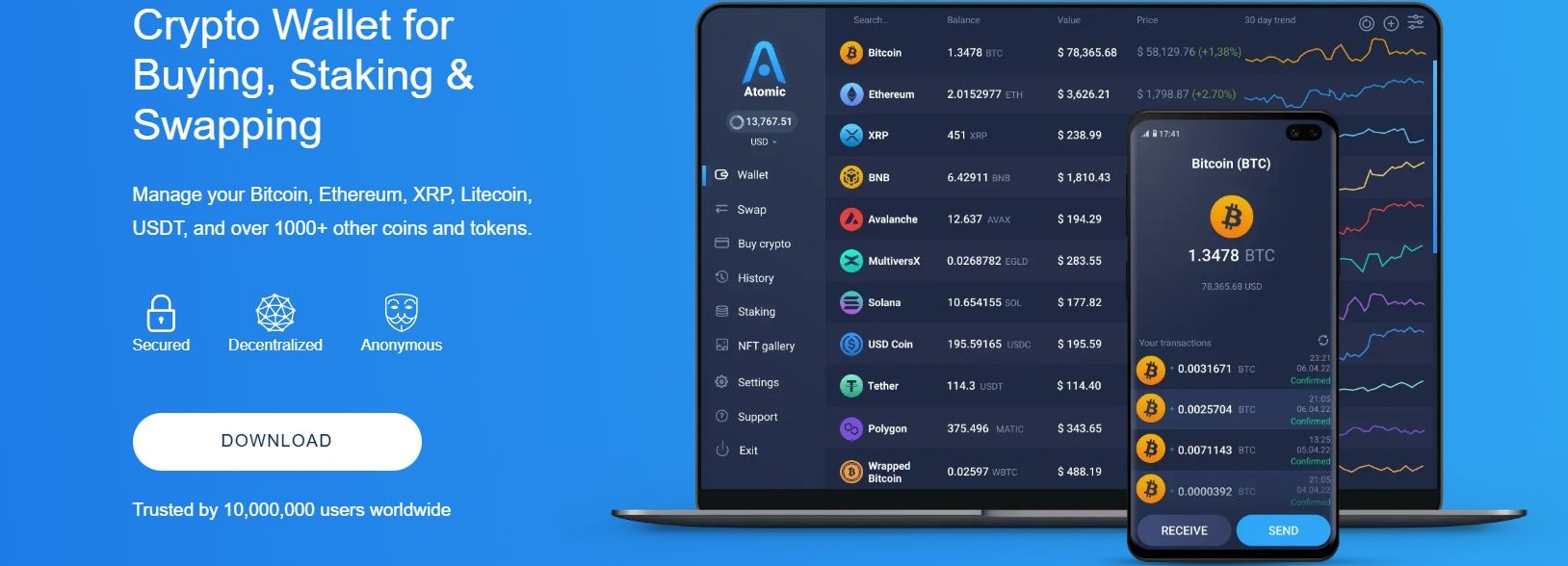 Atomic Wallet offers Multi-Currency Support, Integrated Features, and User-Centric Design. Image via Atomic Wallet
Atomic Wallet offers Multi-Currency Support, Integrated Features, and User-Centric Design. Image via Atomic WalletIf you're juggling multiple cryptocurrencies and seeking a wallet that offers both versatility and control, Atomic Wallet might just be your ideal companion. Designed for users who value a comprehensive feature set without compromising on security, Atomic Wallet brings together a suite of tools tailored for the modern crypto enthusiast.
Overview
Atomic Wallet is a non-custodial, multi-currency wallet supporting over 1000 cryptocurrencies, including Bitcoin, Ethereum, XRP, and a plethora of ERC-20 tokens. Available on Android, iOS, and desktop platforms, it ensures users have access to their assets wherever they go.
Key Features
- In-App Crypto Swaps: Utilize the built-in exchange feature to swap over 60 crypto pairs instantly, thanks to integrations with platforms like Changelly and ShapeShift.
- Staking Capabilities: Stake a variety of assets, such as ADA, BNB, and ATOM, directly from the wallet to earn passive income.
- Private Key Control: Your private keys are encrypted and stored locally, ensuring you maintain full control over your funds.
- User-Friendly Interface: The wallet boasts an intuitive design, making it accessible for both beginners and seasoned traders.
Security is a cornerstone of Atomic Wallet's design. With no centralized servers involved, users' data remains private, and the risk of external breaches is minimized.
Best for: Multi-Currency Support
- Atomic Wallet shines for users managing diverse crypto portfolios. Its extensive asset support, combined with features like in-app swaps and staking, makes it a one-stop solution for those looking to consolidate their crypto activities in a single platform.
For crypto enthusiasts seeking a balance between functionality and security, Atomic Wallet offers a compelling package. Its multi-currency support, integrated features, and user-centric design position it as a top choice for managing a diverse range of digital assets.
You can find more details in our full Atomic Wallet review.
Exodus Wallet
 Exodus Wallet offers a Harmonious Blend of Design, Functionality, and Security. Image via Exodus Wallet
Exodus Wallet offers a Harmonious Blend of Design, Functionality, and Security. Image via Exodus WalletIf you're seeking a crypto wallet that combines visual elegance with robust functionality, Exodus Wallet stands out in 2025. Designed for users who appreciate a seamless experience across devices, Exodus offers a harmonious blend of aesthetics and utility.
Overview
Exodus Wallet is a non-custodial, multi-asset wallet supporting over 260 cryptocurrencies, including Bitcoin, Ethereum, and various altcoins. Available on Android, iOS, desktop, and as a browser extension, it ensures users have consistent access to their assets across platforms.
Key Features
- Visually Appealing Interface: Exodus boasts an intuitive and aesthetically pleasing design, making portfolio management straightforward for both beginners and seasoned users.
- Hardware Wallet Compatibility: For enhanced security, Exodus integrates with Trezor and Ledger hardware wallets, allowing users to manage their assets with added peace of mind.
- In-App Crypto Swaps: Users can seamlessly exchange over 100 supported digital currencies within the wallet, eliminating the need for external exchanges.
- Staking Capabilities: Exodus enables users to stake various assets, such as Cardano (ADA) and Solana (SOL), directly from the wallet to earn passive income.
- Desktop/Mobile Sync: The wallet offers real-time synchronization between desktop and mobile applications, ensuring a cohesive user experience.
Security is paramount with Exodus. Private keys and transaction data are encrypted and stored locally on the user's device, ensuring full control over assets. Additionally, Exodus does not require account setup or verification, preserving user anonymity.
Best for: Desktop/Mobile Sync and Usability
- Exodus Wallet is ideal for users who value a consistent and user-friendly experience across devices. Its seamless synchronization between desktop and mobile platforms ensures that users can manage their portfolios effortlessly, regardless of the device they're using.
Cold vs. Hot Wallets: What's Best for Android?
In the crypto world, there's one question every Android user eventually asks: Should I be using a hot wallet or a cold wallet? The answer depends on how you use your crypto, but knowing the difference is key to making the right call. Let's break it down.
 Pairing a Reliable Hot Wallet with a Secure Cold Wallet App Integration can Strike the Perfect Balance. Image via Freepik
Pairing a Reliable Hot Wallet with a Secure Cold Wallet App Integration can Strike the Perfect Balance. Image via FreepikUnderstanding the Difference
Hot Wallets: Always Online, Always Ready
Hot wallets are apps connected to the internet, like Trust Wallet, MetaMask, or Coinbase Wallet. They’re great for:
- Fast transactions
- DApp access
- On-the-go asset management
Because they’re always online, hot wallets are incredibly convenient — but they’re also more exposed to threats like malware, phishing attacks, or unauthorized remote access.
Cold Wallets: Disconnected = Safer
Cold wallets, on the other hand, store your crypto offline. Devices like the Ledger Nano X or Trezor One are perfect examples. Even if your phone is compromised, the private keys stay locked away in the device and never touch the internet.
And yes, many cold wallets now offer mobile support through companion apps, letting you sign transactions securely using your Android phone without ever exposing your keys online.
When to Use Each
Hot Wallets for Daily Use
If you're regularly swapping tokens, using DeFi apps, or making quick transfers, hot wallets are your best friend. They’re like your checking account — accessible, fast, and fluid.
Cold Wallets for Long-Term Storage
Think of cold wallets as your crypto vault. If you're holding large sums or just want maximum peace of mind, cold storage is the way to go. Ideal for:
- Long-term HODLing
- Minimizing exposure to online risks
- Serious security-first strategies
Best of Both Worlds: Hybrid Approach
Want the perks of both? Use a hybrid strategy:
- Store the bulk of your crypto on a cold wallet (e.g., Ledger Nano X)
- Use a hot wallet like MetaMask for day-to-day transactions
This setup gives you flexibility without compromising your long-term security.
Final Verdict: Which Android Wallet Is Right for You?
With so many excellent options out there, choosing the right Android wallet comes down to who you are and how you use crypto. Your choice comes down to a number of things exclusive to you. The trading volume and frequency, experience, preferences, requirements, privacy, and so on. There's always a wallet that would suit your needs.
- For Beginners
If you're just getting started, simplicity is king. You want a wallet that feels like second nature from the first tap.
Go with: Trust Wallet or Coinbase Wallet
Why? Both offer intuitive interfaces, in-app guides, and user-friendly design. Coinbase Wallet especially stands out for those already using the Coinbase exchange — it’s a seamless transition with support on standby if you hit a snag.
- For Advanced Users
Power users need power features. If you're tweaking gas fees, jumping between chains, or staking tokens across multiple networks, your wallet should keep up.
Go with: MetaMask or Atomic Wallet
Why? MetaMask gives unmatched access to the DeFi world with customizable settings and DApp connectivity. Atomic Wallet complements that with broad token support and staking options — all within a clean interface.
- For Privacy-Conscious Users
Not everyone wants to hand over their personal info just to manage their crypto. If you're privacy-first, you'll want a wallet that respects your anonymity.
Go with: Trust Wallet or Exodus
Why? Both are non-custodial, don't require KYC, and store your data locally. Exodus even lets you get started without an account — no email, no ID, no tracking.
There’s no “best wallet” for everyone — just the best wallet for you. Consider your goals, your habits, and how much control you want over your crypto.





